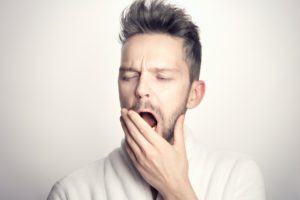07 Feb Sleepless Nights? 3 Signs It Could Be Caused by Your Jaw
 Struggling to get a good night’s sleep? Certain medications, stress, sleep disorders, and other illnesses such as sleep apnea can cause problems sleeping. Most people are unaware that their jaw could be the reason they have sleepless nights.
Struggling to get a good night’s sleep? Certain medications, stress, sleep disorders, and other illnesses such as sleep apnea can cause problems sleeping. Most people are unaware that their jaw could be the reason they have sleepless nights.
Sleep apnea and bruxism are two jaw-related issues that cause people to snore loudly or grind their teeth, disrupting their sleep. TMDs (temporomandibular joint disorders) can result in sore jaws, earaches, headaches and pain behind the eyes. All of these can make falling or staying asleep difficult, but how do you know these issues are caused by your jaw?
1. Do you grind your teeth?
Until their partner complains about the noises they make while sleeping, some of our clients are unaware they are grinding their teeth. Many people who grind their teeth regularly do so at night. This is a common symptom of a disorder called bruxism, which is characterized by the following symptoms:
- During sleep, your jaw is clenched and your teeth are grinding.
- Wear and tear on teeth.
- Fillings, crowns, bridges starting to break or crack.
2. Is sleep apnea causing you to snore?
The most common type of sleep apnea is obstructive sleep apnea. This disorder causes your throat muscles to intermittently relax while you are asleep, blocking your airway. One of the clearest signs of an obstructive airway caused by sleep apnea is snoring. Even if you are not snoring, you might exhibit other symptoms, such as:
- Waking up with a headache
- Your mouth is excessively dry in the morning
- Drowsiness and irritability during the day as a result of a poor night’s sleep.
- You sometimes gasp for air during your sleep
- Staying asleep becomes increasingly difficult
3. Your sore jaw might not be the result of sleep apnea.
Jaw pain can also be a symptom of temporomandibular disorders (TMD). Some people with this disorder do not experience jaw pain, but these cases are the exception rather than the rule. You should watch out for other symptoms, as well. Here are a few:
- Increased difficulty closing or opening your mouth
- Tension headaches
- A clicking or popping sound can be heard when you move your jaw
- Earaches or pain behind your eyes
- Chewing is uncomfortable or causes pain
In Conclusion
If your life is adversely affected by any of the symptoms listed above, you might be suffering from bruxism, sleep apnea or TMD. Contact one of our specialists today to arrange a consultation to discuss your symptoms and get a proper diagnosis.
Image: Unsplash
